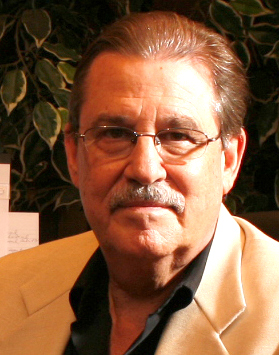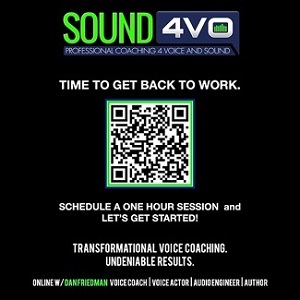|
INCOME Voice Over Compensation: Everybody Talks About It, But What's The Solution For YOU? October 17, 2017  By Jim Conlan By Jim ConlanVoice Actor / Coach You'll find this discussion on any given day, in any given forum, online or in your own community: voice talent compensation is the pits. I think we have a pretty good idea of the problem; my intention isn't to go into that today. What we need are solutions. For starters, I should mention that I don't believe in win-lose scenarios. I'm not interested in fomenting rebellion. No T-shirts or shots across the bow. Instead, I'd like to suggest that perhaps we're looking at the problem from the wrong perspective. Consider the following:
What's the problem, then? Well, I can tell you what mine is: I still occasionally seek work through the painful and disheartening process of auditioning. And who are these auditions for? People I don't know; people who often are looking for a deal first, good talent second. It should be no surprise that they don't pay well. So if you feel you're underpaid, ask yourself these questions:
They have no problem paying me what I'm worth, because they know they're going to get value for what they paid. In return, I make sure I stay in touch with them. And perhaps most important, many of these clients are local. BUT NOT PAID WELL FOR ... Conversely, the projects I don't get paid well for are often (not always) those I audition for. They are not local. I'm an unknown to them and they to me. I may never work with them again, even if I do get the job. This isn't always the case, of course. I'll audition for a project if the fee is posted upfront and it's within my acceptable range. Naturally, given the huge numbers of talent with whom I'll be competing, this is not a high-probability game. I audition and move on. ABOUT AGENTS & AUDIOBOOKS ... If you have an agent, you have an advantage; they will hold the line on acceptable fees. But remember, the job of getting work is up to you, not them. You can't sit around waiting for the phone to ring. Luckily, I have a great agent: Pastorini-Bosby Talent. They make sure that, however I get hired – directly or through them – I get properly compensated. And my repeat business with these clients is exceptionally high. The wild card in the business is, of course, audiobooks. Few of us happen to live in New York, or near an audiobook production company. If we're serious about doing audiobooks and want to be compensated fairly, we're going to have to market ourselves to the high-paying players. Otherwise, we'll simply have to take our chances with auditions. 4-POINT SOLUTION So what do I suggest we do if we have a compensation problem? 1. Market locally first.We're not going to change this commodity climate anytime soon; every sector of the arts is faced with the same dilemma. But with a little more focus on our business, we may be able to avoid it. ----------------- ABOUT JIM James Conlan is a narrator with nearly 70 fiction and non-fiction titles. He has trained dozens of extremely interesting audiobook narrators. Email: provomaster@yahoo.com Web: www.provomaster.com SEE MORE HELPFUL VOICE OVER INCOME ARTICLES HERE |
|
|
Get your bi-weekly dose here ... all things VO!
Email alerts to new VoiceOverXtra articles
On Michael Langsner's Voice-Over Roadmap Podcast
With Sean Daeley and Paul Stefano - check it out!
As of the NEW website launch, 03/22/2012







.png)


Put simply: to stop the freefall of rates, talent (and their agents) need to collectively send a resounding "NO!" to those who put post gigs with abysmally crap-tastic rates - whether by letting them hear the ringing sound of silence when such gigs are posted, or better, going a step further, by having the courage to step up and actively notify the poster and/or venue where such gigs proliferate that such abuse of talent ain't kosher, and that they're not going to see your talent or that of your colleagues until they reset their pricing to more realistic levels.
So...what are those levels?
They're certainly NOT the price guides on P2P sites...they've openly admitted their pricing is basically based on a small survey of their subscribers and not anything in the real world (a/k/a: "we threw stuff against a wall, and got this!").
Not only that - if you use Archive.org's Wayback Machine to compare their rate pages of the biggest P2Ps to the initial versions they created over 10 years ago when their sites were brand new, you'll see that in virtually every category, their rates have remained almost universally UNCHANGED...not even accounting for the even the small, statistically natural yearly percentage bump-ups for inflation (historically 3% per year in the US), cost of living, etc. which smart folks in other industries have negotiated into their yearly work deals if their company isn't providing them to begin with.
Instead, use THESE constantly-updated tools to determine what current "real world" pricing on VO jobs REALLY is - and point the offenders to them to put them on notice that we're onto them, and are banding together...
In the US:
SAG-AFTRA Numbers
http://sagaftranumbers.sagaftra.org/
The Global Voice Acting Academy Standard Industry Rate Guide
http://www.globalvoiceacademy.com/resources/voice-over-industry-standard-rate-guide/
The Voiceover Resource Guide
http://www.voiceoverresourceguide.com/ny/08union.html
Producer's Handy Dandy
http://producershandydandy.com/
In the UK:
UseFee.TV UK/Worldwide Television Usage Fee Calculator
http://usefee.tv/
Gravy For The Brain UK Rate Guide
https://www.gravyforthebrain.com/voiceover-rate-guide/
As Jim said, there are lots more great clients willing to pay us what we're worth than we think.
There's also a lot of who think they can only pay so much - or know otherwise, but don't tell you - who when sent back to the well will return with more than you were initially offered, even though their company was perfectly capable of paying you that higher amount to begin with.
The seeker default needs to be reset from "how low can we go?" back to "who's the best voice for our message?"... and by pushing back collectively against the mediocre and cheap, talent can show we're a smarter bunch who can make this happen for them, so that EVERYONE wins.